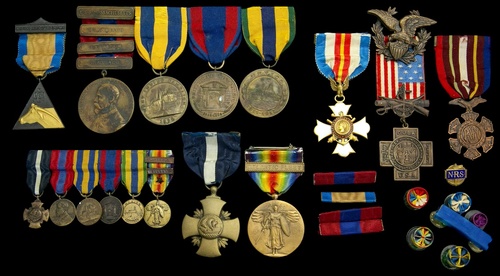
Auction: 347 - The Numismatic Collector's Series Sale
Lot: 54
An Important Spanish-American/WWI group to U.S. Navy Capt. William Wirt Gilmer, Naval Governor of Guam.
a) Navy Cross
b) West Indies Campaign ("Sampson") Medal, four bars - "Santiago" (3x), "U.S.S. Massachusetts" (LIEUT J.G. WILLIAM W. GILMER, U.S.N.)
c) West Indies Campaign (LIEUT J.G.W.W. GILMER. 407. U.S.S. MERRIMAC.), light fraying of riband
d) Philippine Campaign (LIEUT. W.W. GILMER 58 U.S.S. DON JUAN DE AUSTRIA U.S.S. GLACIER)
e) Mexican Service 1911-1917 (3184), light fraying of riband
f) World War I Victory Medal, one bar "Atlantic Fleet"
g) Associated Miniatures of the above -- the WWI Victory Medal with two bars: "Escort" and "Atlantic Fleet" and star, riband edge fraying
h) Naval Order of the Spanish American War; gold, gilt and red, white and blue enamels (Very rare short-lived Order)
i) United Spanish American War Veterans Medal (B 821)
j) Army Navy Union Badge (3 555)
k) Military Order of the Carabao Membership Badge, and stud miniature;
l) and NRS pin, riband bars (4), and rosettes (5)
Born in Chatham, Va, William Wirt Gilmer (1863-1955) graduated from the U.S. Naval Academy in 1885. As an ensign, he served aboard the USS Nipsic (the recommissioned Civil War-era Union gunboat), and as Lieutenant J.G. and Lieutenant aboard various ships during the Spanish American War. On January 2, 1914, Gilmer received command of the USS Montana, which was involved in the occupation of Vera Cruz. During World War I, he commanded the battleship USS South Carolina for which he received the Navy Cross.
Gilmer was appointed the 22nd Naval Governor of Guam in November 1918 amidst a pandemic outbreak of influenza. His administration was controversial and Gilmer would prove to be the most contentious leader in Guam's history. Exercising a great deal of control over the activities of the island's inhabitants, he outlawed alcohol, smoking and whistling, and forbade parties after 10 p.m. He then came into conflict with the island's prominent American families and officials after he forbade marriage between Americans and Chamorro and Filipinos - arguing that such marriages caused servicemen to leave the navy. Petitions and protest against the decree led to a personal letter from the Assistant Secretary of the Navy, Franklin D. Roosevelt ordering the law revoked.
Still, Gilmer returned to serve a second term as Naval Governor on Dec. 21, 1919. Continuing in his autocratic ways, he was removed from power July 7, 1920.
Sold for
$4,000




